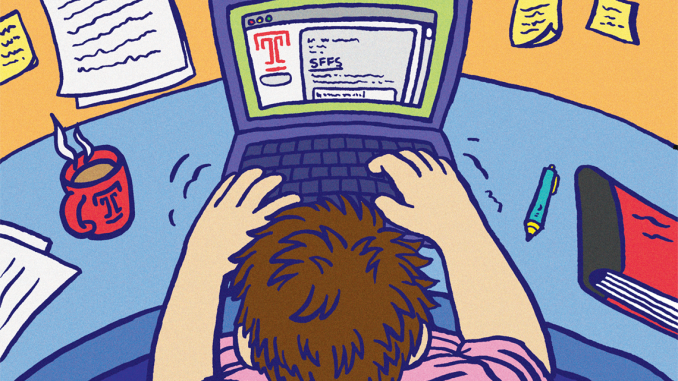
Each semester, Temple University releases Student Feedback Forms to students to gather useful course and teaching data for professors within Temple’s schools and colleges.
As SFFs begin to roll out, students must truthfully complete these convenient and confidential forms to express their opinions or frustrations about their courses and help improve their classes by providing constructive feedback.
The SFFs include five questions that require students to rate how much they learned in the class or how helpful the professor was and three open-ended questions. While SFFs are released to students before the end of the semester, professors don’t receive the feedback until after all grades have been submitted, and the forms are anonymous.
Regardless of whether students have strong opinions on a course, professors use feedback on specific activities, like readings or lectures, when reviewing their syllabi for the next semester. If students express disinterest in a certain reading or lecture, the professor may make changes to that reading or remove it entirely.
They’re also considered when full-time faculty members apply for merit raises or teaching awards and when rehiring part-time faculty each semester.
When filling out SFFs, students should include what they enjoyed or disliked about a professor’s teaching style, what contributed to their learning and what improvements should be made to make the class more effective.
Many times students don’t get the opportunity to express things they struggled with or disliked about the class with other people, said Trinity Brown, a junior sociology major.
“It gives us a chance to give an honest opinion about how the class went, if the professor was organized and the professor taught well and if they liked the technique with learning,” Brown said.
The university’s goal is to have between 50 to 60 percent of students respond to the survey, said Gina Calzaferri, the director of assessment and evaluation in the Office of Institutional Research and Assessment.
Only roughly 40 percent of students responded due to the pandemic because students may have been tired from staring at computer screens, Calzaferri added.
Because response rates are low, departments must be careful when interpreting results, said Dustin Kidd, a sociology professor and chair of the sociology department.
“There’s just a number of kinds of bias that can take place in terms of how students respond to faculty, or how they might write about what their faculty members are doing or what their expectations are from their faculty members,” Kidd said.
Low response rates in surveys can increase the risk of voluntary response bias, which occurs when members of the survey are self-selected volunteers. This is especially common among students who had a bad experience in their class, and may use these forms as an outlet for their frustrations in a negative way.
When students complete the forms in an unprofessional manner, some professors are able to brush it off, but they’re not given thoughtful feedback, said Wendy Cheesman, the program director of the Health and Rehabilitation Sciences department.
“If you are thoughtful in the way that you’re providing that feedback because you want the experience to be better, we take that very seriously,” Cheesman said.
While it’s important that students fill out their forms honestly, they must do it in a way that is still professional and provides constructive feedback rather than attacking their professors.
Whether students realize it or not, hateful messages toward professors through the forms can contribute to lower competence perceptions, job dissatisfaction, emotional exhaustion and stress among faculty, according to Sage Journals, an academic publisher.
“I know faculty who have a really hard time reading them because they’ve heard some really unkind words in those feedback forms, and I know that no student wants to be graded with unkindness,” Kidd said. “Please know that faculty don’t want to be assessed with unkindness either.”
All students should be filling out SFFs as a way to provide feedback to their professors and departments to invoke change. However, students must be mindful that their forms do have an effect on professors, whether it be through evaluation or mental health, and should maintain professionalism in their responses.


Be the first to comment